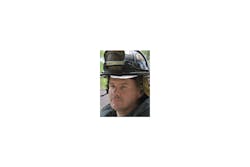Pennington: Facing the Fear of Failure
In the fire service we are required to perform at a high level on a moments notice. In preparation for these moments we spend countless hours training, learning, and preparing for that day. In your preparation process, how often do you fail at a skill or evolution? Does fear creep into your life when it’s time to train? Now your asking, fear? Really?
I’m not talking about the physical fear of death or injury, I am referring to the fear of failure. We don't want to take on training that we cannot complete in the manor required. None of us would want to be seen as an incapable firefighter if we fail during any mission. Does this apprehension keep you from showing up on drill night or send your pulse through the roof when your station is called to the training center?
A lot of us have been out of a formal education (school) for many years. Being this removed from the educational setting can cause anxiety for many adults. Over my time as an instructor I have seen many examples of this, especially in the beginning of the class. Until the instructor sets the tone many students will not engage or volunteer to participate in the session. Breaking down this barrier has many variables. The main one is the environment of the class. Keeping it positive and non-confrontational is the best way to break down these barriers.
What Is Fear?
Fear is defined as “an unpleasant emotion caused by the belief that someone or something is dangerous, likely to cause pain, or a threat.” While the threat in performing a skill can come from physical pain or death, let’s put that fear aside for this post. Let's look at the part that could be perceived as emotionally painful or socially threatening. I often refer to fire departments as being an organized high school. We have jocks, geeks, teacher's pets, and any other variety of personalities mixed together. Saying that it is a semi-social environment would be an understatement. We spend countless hours living and working together and how we interact with each other can determine how we accept and receive training opportunities.
Do your members ridicule a firefighter who has trouble with a skill? If so, the fear of being on the receiving end can cause a firefighter so much apprehension that they may not show up for the training and, if they do their guard will be so high that they may not fully participate. In this example the fear of failure is caused by the ridicule that will be a direct result of the poking fun or derogatory statements. Fear like this can cripple a person and keep them from giving 100% percent of their effort.
Making Environmental Changes
To truly realize our potential as firefighters we must change the training environment towards a positive experience that will encourage 100% participation and allow firefighters to try new techniques and skills without the fear of ridicule.
How Do We Do This?
It starts with you. Begin encouraging the firefighters around you at the station and giving positive feedback and comments. You will be surprised at the reactions most will give you and their response, usually, is in the same positive manor. It also starts with you and your response to someone failing. If you see someone struggling or failing, it isn’t the time to call names or poke fun. This is the time to lift them up and encourage them to try harder or revisit the learning points. Keep the encouragement constant, direct, and to the point. When pointing out a deficiency point it our and explain the process of correction.
Embrace Failure
Now that we have a positive environment in place its time to get uncomfortable. Get uncomfortable by pushing your limits, and breaking things. I’m not talking about breaking equipment or injuring firefighters, but rather talking about reviewing a current procedure and finding new ways of accomplishing the same task. AKA Break IT!!
Exploring new ways to accomplish the same tasks can cause us to find the new means to do get it done or illustrate why the current way is most appropriate. How would you know either if you don’t take the time to step out of the comfort zone and try something new? What’s the worst that could happen? You fail?
Failing could be the best lesson learning environment possible. If you continue to be the best at a skill and never experience a setback would you be encouraged to seek out a chances to train, no. This constant success can allow the complacency to slowly creep in. By looking at different techniques and ways of accomplishing task will push your limits and may cause you to fail. But who cares if you fail in a safe manor and a positive environment!
Conclusion
It’s this jumpseat rider's opinion that best lessons have came from my failures. Failing to meet the reasonable expectations set forth by my department or myself pushes us all to step it up a notch. Embrace that failure and push yourself to get better everyday! In failing your life is not a failure, it’s just a performance marker that needs elevated! After reading this, hit the drill floor and break something! Not literally, but find a way of doing a task and search out new ways to complete it What’s the worst that could happen? You fail?
